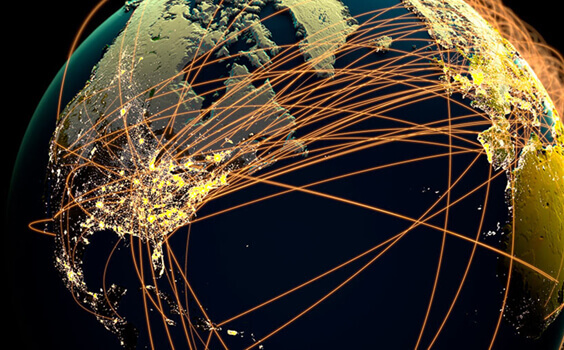It’s past time we debate why rescuing our children, our communities, and our country from fascist/Marxist ideologies, holds more consequence than “mere” politics. We should not only be striving for the very soul of America, but most especially, urgently striving for all the souls in America.
On the topic of the new “world order,” we’ve charted the course of our future without realizing it was literally manufactured during the Second World War.
By 1945, America dwarfed the entire world in military might; especially her navy, which became the largest in all of history by an order of magnitude. America’s massive economy triggered a new world economy. Nearly eighty years has been more than enough time to believe that globalization could never really end. After 2020, I don’t think we have much excuse for believing that any longer.
The world order has been changing for a long time, but now it’s changing quickly. Globalization as we now know is hitting its shelf life. It’s actually playing out—slowly at first, but eventually in terms of geopolitical timelines—suddenly. A properly informed, attentive Christian worldview includes an awareness to sudden change.
Americans have good reason to be concerned about supply chain interruptions, work force disruption, and most importantly, a shift away from the super-power status we have enjoyed for decades.
So, what is globalization, and how does it differ from globalism? As pediaa.com explains, “Globalism is a broad term we can generally define as an ideological commitment in favor of globalization. It’s a view that considers globalization as entirely positive. Moreover, the ideology of globalism is based on the belief that people, information, and goods should be able to cross national borders unrestricted.”
Simply stated, globalism is an ideology based on the belief that people, information, and goods should be able to cross national borders unrestricted, while globalization is the mechanics of spreading that technology, products, information, and jobs across nations.
For nations that prefer to maintain sovereignty, or nations that survive by stability, globalization is debatable.
Sooner, rather than later, the way things have always been will change, and we will need to adapt..

In “The End of the World is Just the Beginning: Mapping the Collapse of Globalization” by Peter Zeihan, Harper Business—June 14, 2022, is now a New York Times bestseller. Zeihan (pictured) explains how globalization actually was created. The history is surprising and illuminating. I would wager most people have not given the subject the thought it urgently deserves.
We are seeing signs—in petroleum production, military invasion, shortages in high-tech products—globalization is about to collapse, and when it does, from Zeihan’s historical perspective, things are going to get pretty grim. He claims that America’s explosive economic juggernaut created her preeminence in the world and created hegemonies around the world. If America retreats to some form of isolationism, the loss of her historic strength and international protection will create a vacuum. Globalization, spurred by globalism, created unprecedented prosperity, and even freedom in many parts of the world. Absent globalization, great upheaval is inevitable.
In a recent podcast interview, Doug Wilson warns us, “If he [Zeihan] is correct about everything than a lot of the world is going to go through a catastrophic time. If he’s partially right then it’s going to be a tumultuous time, but it’ would be good for us to be preparing regardless. [A] lot of the world is going to go through a catastrophic time, [as] mission boards, denominations that send missionaries, denominations that have churches overseas, people who’ve immigrated to the United States who still have family in South Africa, or family in eastern Europe, or family in Brazil, this book is… really good to read.”
Without doubt, scripture tells any time man attempts “globalization” it is ruled by wicked, ungodly empires. We should oppose globalization to the extent that we comprehend it to be devised by Satan—the god of this age. (2 Corinthians 4:4). Got Questions asserts, “It is interesting to note that man’s (and Satan’s) final attempt at globalization will include a resurgence of ‘Babylon,’ which started the globalization effort so long ago,” (Read Revelation 18)
Is this period of globalization—indeed globalization in toto—heralding the final kingdom Daniel 2:41 prophesied? An interesting case can be made for comparing globalization to an empire. This view should have some traction among premillennialists most particularly.
We are living in the “brave new world” in many respects. Christians must address this reality as never before—with a true sense of urgency. The stakes for winning the lost souls through evangelism and discipleship has always been high, but we have to believe time is running out. The season of “Piety in the Skyety” is over.
Running out of time is not just a toss-away aphorism anymore. With Marxist ideologues decimating families, woke insanities overwhelming every institution, the American Christian ought to be rethinking what evangelism and discipleship must look like in this new age. International commerce and travel will be hugely impacted by a collapse of globalization. Wilson believes student mission trips will be out of the question. In this dystopian setting, that seems like a reasonable conclusion.
That is why I believe this new world order will necessitate rethinking how we prepare and equip the peoples of the world beyond our shores; not only with indigenous language Bibles, but with the training and equipping these peoples are pleading for. It would be evangelism unlike anything we have ever seen before. Imagine the possibilities of technology and innovation, imbued with the power of Holy Spirit, arming all peoples with the genuine knowledge of their savior and king. This should be the definition of globalism. I believe one day it will be.
- And you will say in that day: “Give thanks to the Lord, call upon his name, make known his deeds among the peoples, proclaim that his name is exalted. (Isaiah 12:4)
Jesus Christ admonished His disciples to proclaim the message of salvation throughout the world. Making disciples is not an act of patriotism, but it contributes to our nation’s continued prosperity, and we must contribute to it any way possible. This is a biblical view of globalism.
- Therefore go and make disciples of all nations, baptizing them in the name of the Father and of the Son and of the Holy Spirit, and teaching them to obey everything I have commanded you. (Matthew 28:19-20)






